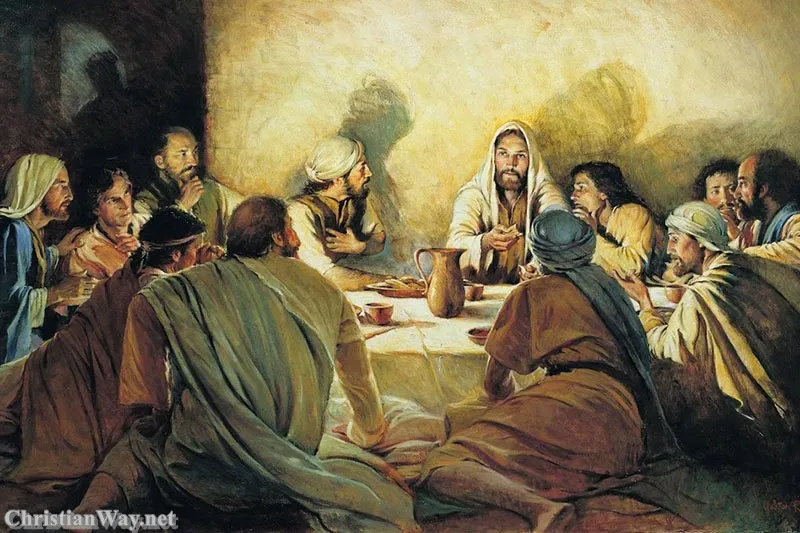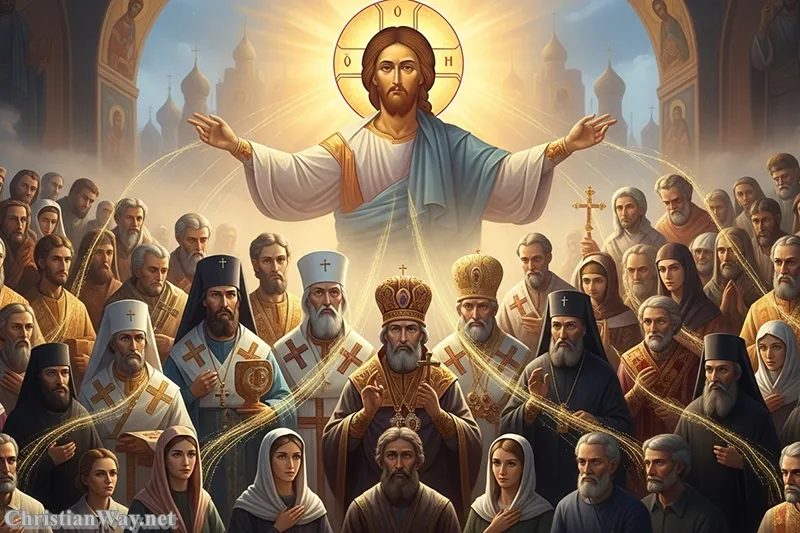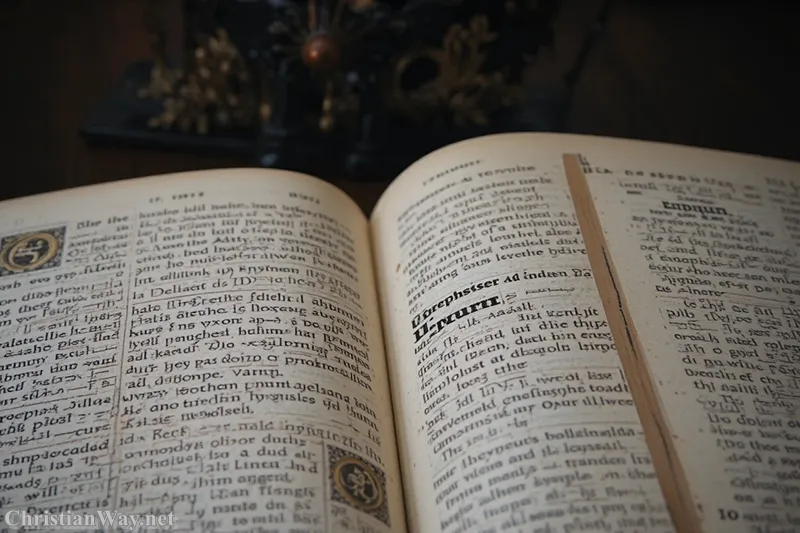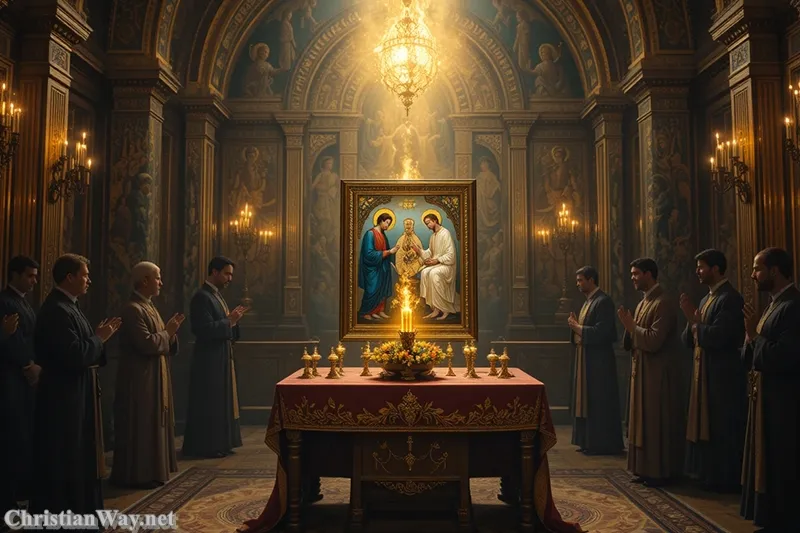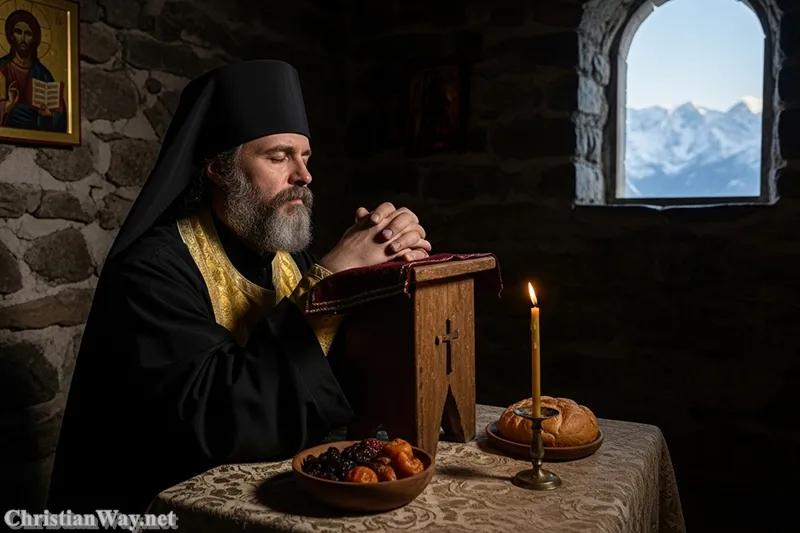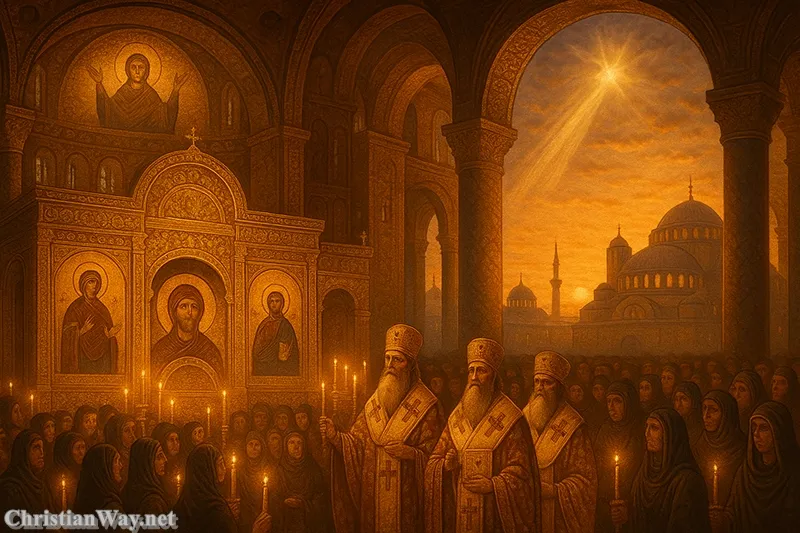Dear friends in Christ,
Every time we breathe, we share in a mystery that the early Church Fathers never tired of proclaiming — the mystery of life itself as a gift of the Holy Spirit. For the Orthodox Church, the Holy Spirit is not a distant concept, nor merely a divine power or influence. He is the very breath of God, the living presence who animates every moment of worship, every act of love, and every movement of the heart toward holiness.
When we say in the Creed, “I believe in the Holy Spirit, the Lord, the Giver of Life,” we are not reciting a mere formula. We are confessing the truth that the entire life of the Church — her sacraments, her prayer, her unity, her holiness — springs from the Spirit who descended upon the Apostles at Pentecost and has never departed from Christ’s Body. In Orthodox life, the Holy Spirit is the pulse of divine grace — unseen, yet everywhere active, sanctifying creation and drawing all things toward the glory of God.
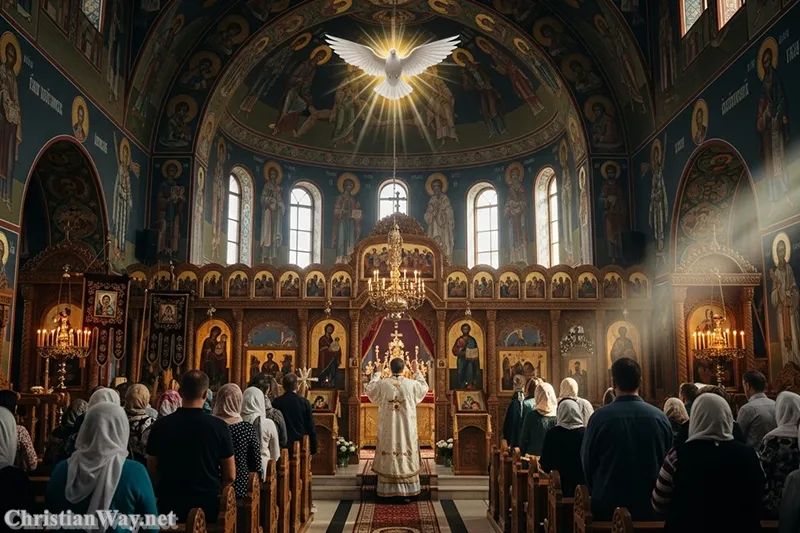
Let us then contemplate, with reverence and gratitude, how the Holy Spirit is experienced and lived in the Orthodox Church — not as a distant mystery, but as the intimate companion of every believer and the unifying soul of the Church herself.
The Spirit Who Gives Life to the Church
From the very beginning, the Orthodox Church has understood herself as a Pentecostal community — not in the modern sense of emotional expression, but in the deeper reality of living under the perpetual outpouring of the Spirit. On the day of Pentecost, when “suddenly there came a sound from heaven, as of a rushing mighty wind,” the world witnessed the birth of the Church (Acts 2:2). Fire descended, not to consume, but to illumine; wind came, not to scatter, but to gather all nations into one Body.
This descent of the Spirit was not a one-time event, nor a passing fervor. It was the beginning of a divine indwelling that continues in every generation. The Orthodox Church believes that the same Spirit who came upon the Apostles continues to guide, sanctify, and preserve the Church in all truth. As Christ Himself promised, “When the Spirit of truth comes, He will guide you into all the truth” (John 16:13).
In this light, the Church is not merely a human institution. She is a living organism, filled with the divine breath of God. Without the Holy Spirit, the Church would be a corpse — full of form but empty of life. But through the Spirit, she is ever renewed, her sacraments made effective, her bishops and priests ordained, her believers sanctified, and her unity maintained in love.
The Holy Spirit in Orthodox Worship
The Liturgy as Epiclesis
Nowhere is the presence of the Holy Spirit more profoundly experienced than in the Divine Liturgy. Every Orthodox Christian knows that the center of the Liturgy is not merely the recitation of words, but the epiclesis — the invocation of the Holy Spirit upon the gifts of bread and wine, and upon the faithful themselves.
The priest, standing before the altar, stretches out his hands and prays:
“Send down Your Holy Spirit upon us and upon these gifts here offered, and make this bread the precious Body of Your Christ, and that which is in this cup the precious Blood of Your Christ, changing them by Your Holy Spirit.”
Here the Orthodox Church confesses that the transformation of the Eucharistic gifts — and of the faithful who receive them — is the work of the Spirit. It is He who makes Christ present in the Sacrament, just as He overshadowed the Virgin Mary at the Annunciation. Every Liturgy is therefore a new Pentecost — heaven and earth meeting again through the Spirit who gives life.
The Spirit and the Sacred Beauty
In Orthodox worship, the Holy Spirit is also felt through the beauty of holiness — the chant, the icons, the incense, the light of candles. These are not ornaments or aesthetic extras; they are vessels of grace through which the Spirit touches the senses and lifts the soul. As St. Basil the Great wrote, “Through the Holy Spirit, the heart is lifted up, and those who were earthly are made spiritual.”
Thus, in the rhythm of the Liturgy, the Orthodox Christian learns to breathe with the Spirit — to let prayer, gesture, and silence form a harmony that reveals God’s indwelling presence.
The Holy Spirit in the Sacramental Life
The Orthodox Church calls the sacraments “mysteries,” not because they are obscure, but because they are realities of divine grace beyond human comprehension. And in every mystery, it is the Holy Spirit who acts — unseen yet effectual.
Baptism and Chrismation
In Baptism, the Spirit purifies and gives new birth. As the priest immerses the catechumen three times in the water, he calls upon the Trinity, and the Spirit restores what was lost by sin. Then, immediately following, comes Chrismation, the Orthodox equivalent of Confirmation. With holy chrism, the priest anoints the newly baptized, saying, “The seal of the gift of the Holy Spirit.”
Here the Holy Spirit is not given as an optional blessing but as the very seal of belonging — the personal Pentecost of each believer. The same Spirit who descended upon the Apostles descends now upon every soul, making each Christian a temple of God.
Ordination and the Continuity of Grace
In Holy Orders, too, it is the Spirit who ordains. The bishop lays hands upon the candidate and invokes the descent of the Holy Spirit: “The grace divine, which always heals the infirm and completes that which is lacking, ordains the deacon (or priest, or bishop).” The Orthodox Church never views ordination as a human appointment; it is a divine act, the Spirit preserving apostolic succession through the ages.
Through this, the Orthodox faithful believe that their Church remains unchanged in essence since Pentecost, living in the same Spirit who inspired the first Apostles.
The Spirit as the Soul of Prayer
Orthodox spirituality is profoundly Trinitarian, yet it breathes especially in the rhythm of the Spirit. The Church Fathers teach that to pray is already to have the Spirit dwelling within. St. Paul says, “The Spirit helps us in our weakness; for we do not know how to pray as we ought, but the Spirit Himself intercedes for us with sighs too deep for words” (Romans 8:26).
In Orthodox prayer, this truth becomes experiential. The Jesus Prayer — “Lord Jesus Christ, Son of God, have mercy on me, a sinner” — is often repeated with the rhythm of breathing, symbolizing the Spirit as breath within us. The repetition is not mechanical but contemplative: it becomes the resting of the heart in God, a movement of the Spirit transforming human weakness into divine communion.
The icons of Pentecost often depict the Apostles seated in silence, awaiting the descent of the Spirit. This posture is also the image of prayer itself — waiting, open, receptive. The Orthodox life of prayer, whether in the quiet of a monastery or the heart of a city, is a continual waiting upon the Spirit who whispers peace into the chaos of the world.
The Spirit and the Life of Holiness
The Spirit as Fire
The Fathers of the Church often describe the Holy Spirit as fire — not a destructive flame, but one that purifies, enlightens, and sanctifies. In the words of St. Seraphim of Sarov, “The true aim of our Christian life is the acquisition of the Holy Spirit of God.”
This is not mere mysticism; it is the daily pursuit of holiness. The Orthodox understanding of theosis — deification — is the gradual transformation of the believer by grace into the likeness of God. And this happens through the indwelling of the Spirit, who unites the human and the divine in Christ.
The Fruits of the Spirit
As St. Paul teaches, “The fruit of the Spirit is love, joy, peace, patience, kindness, goodness, faithfulness, gentleness, self-control” (Galatians 5:22–23). These are not virtues we produce by effort alone; they are the evidence that the Spirit is alive within us. The Orthodox Christian seeks to cooperate with grace — through prayer, fasting, confession, and acts of mercy — so that the Spirit may bear fruit in his or her life.
The Spirit in Community
The Orthodox Church does not view holiness as a private achievement but as a communal reality. The Spirit gathers believers into one Body, making each a member of the other. This is why the Church is called “sobornaya” — conciliar, catholic, gathered together in love. The Spirit is the bond of unity, healing divisions, reconciling hearts, and keeping the Church one even amid human frailty.
The Spirit in the World
The Orthodox vision of the Holy Spirit extends beyond the walls of the Church. The Spirit is active in all creation — the life-giving breath that sustains the universe. As the Psalmist sings, “When You send forth Your Spirit, they are created, and You renew the face of the earth” (Psalm 104:30).
This understanding shapes the Orthodox sense of sacramentality in the world — the belief that creation is not inert matter but a transparent icon of God’s presence. The Holy Spirit fills the earth with divine energy, inviting humanity to live in harmony with all that God has made.
Even in a world marked by conflict and confusion, the Orthodox Christian sees signs of the Spirit’s presence: every act of compassion, every movement toward justice, every longing for beauty or peace is a spark of divine breath still active among us.
The Mystery of the Spirit in the Saints
The saints of the Orthodox Church — those luminous lives who have reflected Christ in every generation — are the clearest witnesses of the Spirit’s work. Their lives reveal that the Spirit is not only the Giver of doctrine but the Giver of holiness.
When one reads the life of St. Seraphim of Sarov, who greeted every soul with the words, “My joy, Christ is risen!” or St. Gregory Palamas, who taught that divine light can fill the human heart, one sees that sanctity is nothing less than being aflame with the Holy Spirit.
The saints are not distant heroes; they are men and women who have become transparent to the Spirit, showing us what it means to live in communion with God even in this world.
The Spirit Who Dwells Within
Finally, the Orthodox Church teaches that every Christian is called to live a life “in the Spirit” — not merely believing in Him, but dwelling with Him, being led, purified, and strengthened by Him.
St. Paul writes, “Do you not know that your body is a temple of the Holy Spirit within you?” (1 Corinthians 6:19). This is the heart of Orthodox spirituality: the awareness that God is not far away. He is closer than our own breath. Through repentance, the sacraments, and prayer, the believer learns to recognize and cooperate with this indwelling grace — to let every thought, word, and deed be inspired by the Spirit of life.
To live in the Spirit is to live in continual thanksgiving, to see the world as filled with divine light, and to trust that even in darkness, the breath of God is still at work.
In the Light of the Spirit
The Orthodox Church, with her ancient liturgies and unbroken tradition, remains a living witness to the truth that the Holy Spirit is the life of the Church and the soul of the believer. He unites heaven and earth, sanctifies the sacraments, strengthens the saints, and renews the face of creation.
To live in the Orthodox way is to live in a continual Pentecost — to let the Spirit who once filled the upper room fill our hearts, our homes, and our world.
Let us, then, pray with humility and longing:
“O Heavenly King, Comforter, Spirit of Truth, who are everywhere present and fill all things, Treasury of blessings and Giver of life, come and dwell in us, cleanse us from every stain, and save our souls, O Good One.”
May the Holy Spirit dwell richly within you — guiding your thoughts, sanctifying your heart, and leading you ever closer to the fullness of divine love in Christ Jesus our Lord.
— Fr. John Matthew, for Christian Way
